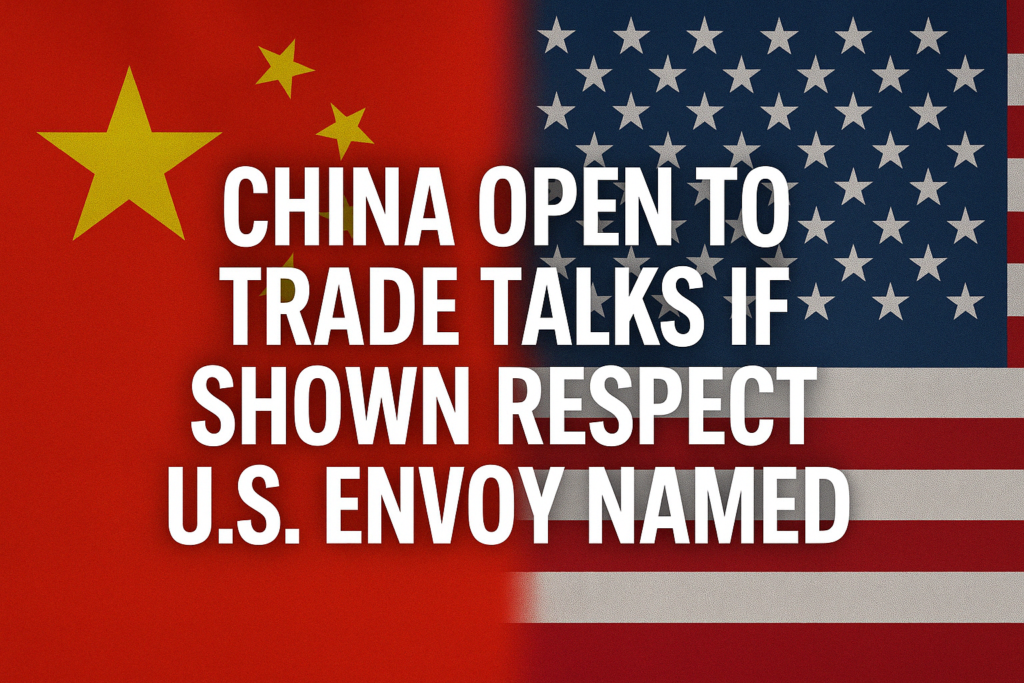Published: April 16, 2025
 By: Global Diplomacy & Trade Intelligence Desk
By: Global Diplomacy & Trade Intelligence Desk
 Source: GlobalWorldCitizen.com
Source: GlobalWorldCitizen.com
 China Open to U.S. Trade Negotiations — But Sets Diplomatic Preconditions
China Open to U.S. Trade Negotiations — But Sets Diplomatic Preconditions
In a potential turning point for U.S.-China trade relations, Beijing has indicated a willingness to reengage in high-level negotiations—but only if specific diplomatic conditions are met. Chinese officials are seeking assurances of mutual respect, clear messaging, and a designated U.S. envoy with full presidential authority before formal trade talks can resume.
This development comes amid heightened tensions over tariffs, technology restrictions, and geopolitical rhetoric, as the global economy watches closely.
 China’s Key Demands to Resume Trade Talks
China’s Key Demands to Resume Trade Talks
 1. Respectful Dialogue and Tone
1. Respectful Dialogue and Tone
Beijing is calling for a measured diplomatic tone from U.S. officials, urging an end to inflammatory or dismissive comments from cabinet members and advisers.
 2. Unified U.S. Position on Negotiations
2. Unified U.S. Position on Negotiations
Chinese officials are concerned by conflicting messages from the Trump administration. A single, consistent trade policy voice is seen as essential to reestablish trust.
 3. A Presidential-Level Trade Negotiator
3. A Presidential-Level Trade Negotiator
China is demanding a point person backed directly by President Trump—someone with the authority to shape and finalize a trade agreement that could pave the way for a formal summit with President Xi Jinping.
 4. Recognition of China’s Core Concerns
4. Recognition of China’s Core Concerns
Among the critical issues raised by Beijing:
U.S. sanctions and export controls, including restrictions on advanced semiconductors such as Nvidia’s H20 chip
Taiwan and rising U.S. military presence in the Indo-Pacific
A belief that U.S. trade and tech policies are intended to contain China’s economic modernization
 Early Market Reactions Signal Cautious Optimism
Early Market Reactions Signal Cautious Optimism
Following initial reports that China may resume bilateral trade discussions, global financial markets responded:
Offshore yuan rose by 0.2%
Australian dollar (a China proxy) gained 0.5%
S&P 500 futures narrowed losses from -1.6% to -0.4%
These movements suggest investors are closely watching for signs of de-escalation in the U.S.-China economic conflict.
 Diplomatic Strains Remain Under the Surface
Diplomatic Strains Remain Under the Surface
Despite measured language from President Trump toward Xi Jinping, administration officials have made more aggressive remarks, complicating the tone of engagement. Most recently, Chinese diplomats denounced Vice President JD Vance for what they called “ignorant and disrespectful” language toward Chinese citizens—a rare and direct diplomatic rebuke.
China’s insistence on respectful discourse underscores its broader strategy of positioning itself as a global leader in cooperative trade diplomacy.
 GlobalWorldCitizen.com Insight: Diplomacy Over Discord
GlobalWorldCitizen.com Insight: Diplomacy Over Discord
“Global economic stability hinges on diplomacy, not ego.”
— GlobalWorldCitizen.com Editorial Insight
This pivotal moment offers an opportunity for strategic realignment between the world’s two largest economies. A return to constructive U.S.-China trade talks could stabilize global markets, safeguard critical supply chains, and revive cooperation on technology, climate, and development.
Questions for Global Citizens:
Can economic diplomacy overcome nationalistic pressure?
Will mutual respect return to international negotiations?
Can this momentum expand beyond trade to global collaboration?

 Final Word from GlobalWorldCitizen.com
Final Word from GlobalWorldCitizen.com
Trade is no longer just an economic issue—it’s a strategic pillar of global peace, innovation, and shared prosperity. As the U.S. and China consider returning to the table, the world watches not just for headlines—but for real leadership.

U.S.-China trade negotiations
Diplomatic strategy & geopolitical shifts
Market impacts and supply chain developments
Voices from the Global South and emerging markets
We believe in diplomacy-driven global leadership—for economies, for peace, for the people.

